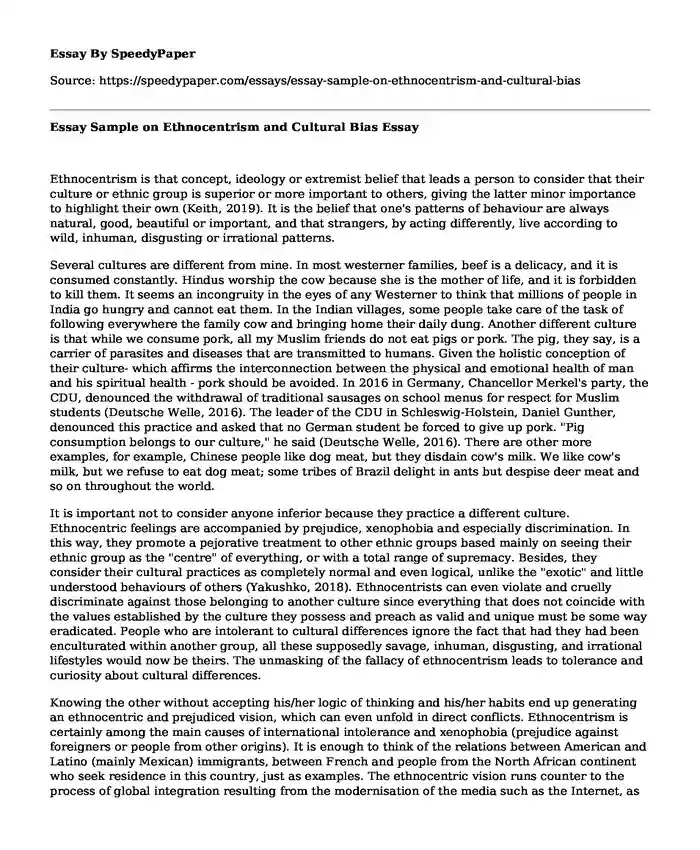
| Type of paper: | Critical thinking |
| Categories: | Discrimination Multiculturalism |
| Pages: | 3 |
| Wordcount: | 787 words |
Ethnocentrism is that concept, ideology or extremist belief that leads a person to consider that their culture or ethnic group is superior or more important to others, giving the latter minor importance to highlight their own (Keith, 2019). It is the belief that one's patterns of behaviour are always natural, good, beautiful or important, and that strangers, by acting differently, live according to wild, inhuman, disgusting or irrational patterns.
Several cultures are different from mine. In most westerner families, beef is a delicacy, and it is consumed constantly. Hindus worship the cow because she is the mother of life, and it is forbidden to kill them. It seems an incongruity in the eyes of any Westerner to think that millions of people in India go hungry and cannot eat them. In the Indian villages, some people take care of the task of following everywhere the family cow and bringing home their daily dung. Another different culture is that while we consume pork, all my Muslim friends do not eat pigs or pork. The pig, they say, is a carrier of parasites and diseases that are transmitted to humans. Given the holistic conception of their culture- which affirms the interconnection between the physical and emotional health of man and his spiritual health - pork should be avoided. In 2016 in Germany, Chancellor Merkel's party, the CDU, denounced the withdrawal of traditional sausages on school menus for respect for Muslim students (Deutsche Welle, 2016). The leader of the CDU in Schleswig-Holstein, Daniel Gunther, denounced this practice and asked that no German student be forced to give up pork. "Pig consumption belongs to our culture," he said (Deutsche Welle, 2016). There are other more examples, for example, Chinese people like dog meat, but they disdain cow's milk. We like cow's milk, but we refuse to eat dog meat; some tribes of Brazil delight in ants but despise deer meat and so on throughout the world.
It is important not to consider anyone inferior because they practice a different culture. Ethnocentric feelings are accompanied by prejudice, xenophobia and especially discrimination. In this way, they promote a pejorative treatment to other ethnic groups based mainly on seeing their ethnic group as the "centre" of everything, or with a total range of supremacy. Besides, they consider their cultural practices as completely normal and even logical, unlike the "exotic" and little understood behaviours of others (Yakushko, 2018). Ethnocentrists can even violate and cruelly discriminate against those belonging to another culture since everything that does not coincide with the values established by the culture they possess and preach as valid and unique must be some way eradicated. People who are intolerant to cultural differences ignore the fact that had they had been enculturated within another group, all these supposedly savage, inhuman, disgusting, and irrational lifestyles would now be theirs. The unmasking of the fallacy of ethnocentrism leads to tolerance and curiosity about cultural differences.
Knowing the other without accepting his/her logic of thinking and his/her habits end up generating an ethnocentric and prejudiced vision, which can even unfold in direct conflicts. Ethnocentrism is certainly among the main causes of international intolerance and xenophobia (prejudice against foreigners or people from other origins). It is enough to think of the relations between American and Latino (mainly Mexican) immigrants, between French and people from the North African continent who seek residence in this country, just as examples. The ethnocentric vision runs counter to the process of global integration resulting from the modernisation of the media such as the Internet, as it is synonymous with strangeness and lack of tolerance. People should embrace cultural universalism, which affirms the existence of values, moral judgments and other behaviours with absolute value applicable to all humanity since relativism defends the validity and richness of any cultural system and denies any absolutist valuation moral or ethics thereof (Ayres, 2019). This is due to the diversity of ideas and values between different societies, which is why it is impossible to judge a cultural element of one society from the patterns of another. Its characteristic features can only be analyzed within the same system to which they belong that the only important thing is that they make sense within that culture. Therefore, they are as worthy of respect as any other.
References
Ayres, C. (2019). 17 Cultural Relativism Advantages and Disadvantages. Retrieved from https://vittana.org/17-cultural-relativism-advantages-and-disadvantages on 16th June 2019.
Deutsche Welle (2016). Schleswig-Holstein CDU fights to keep pork on canteen menus. Retrieved from https://www.dw.com/en/schleswig-holstein-cdu-fights-to-keep-pork-on-canteen-menus/a-19085870 on 16th June 2019.
Keith, K. D. (2019). Ethnocentrism: Seeing the world from where we stand. Crosscultural psychology: Contemporary themes and perspectives, 23-38.
Yakushko, O. (2018). Hatred of Strangers: Defining Xenophobia and Related Concepts. In Modern-Day Xenophobia (pp. 11-31). Palgrave Macmillan, Cham.
Cite this page
Essay Sample on Ethnocentrism and Cultural Bias. (2023, Jan 15). Retrieved from https://speedypaper.net/essays/essay-sample-on-ethnocentrism-and-cultural-bias
Request Removal
If you are the original author of this essay and no longer wish to have it published on the SpeedyPaper website, please click below to request its removal:
- Network Protocols - Computer Science Essay Example
- The Race Debate in the Recitatif by the Toni Morrison
- Word Count 2025How Racism Propagated By The Film Industry Is Shaping The Society: Unfair Portrayal Of African Americans In The Film Industry.
- Essay Sample Discussing the Responsibilities of a Pharmacist toward a Patient
- Free Essay Sample: Culture and Structure
- Paper Example: Charles Dickens. Hard times.
- Free Essay: Market Attractiveness of Hydraforte Hand and Body Cream
Popular categories




